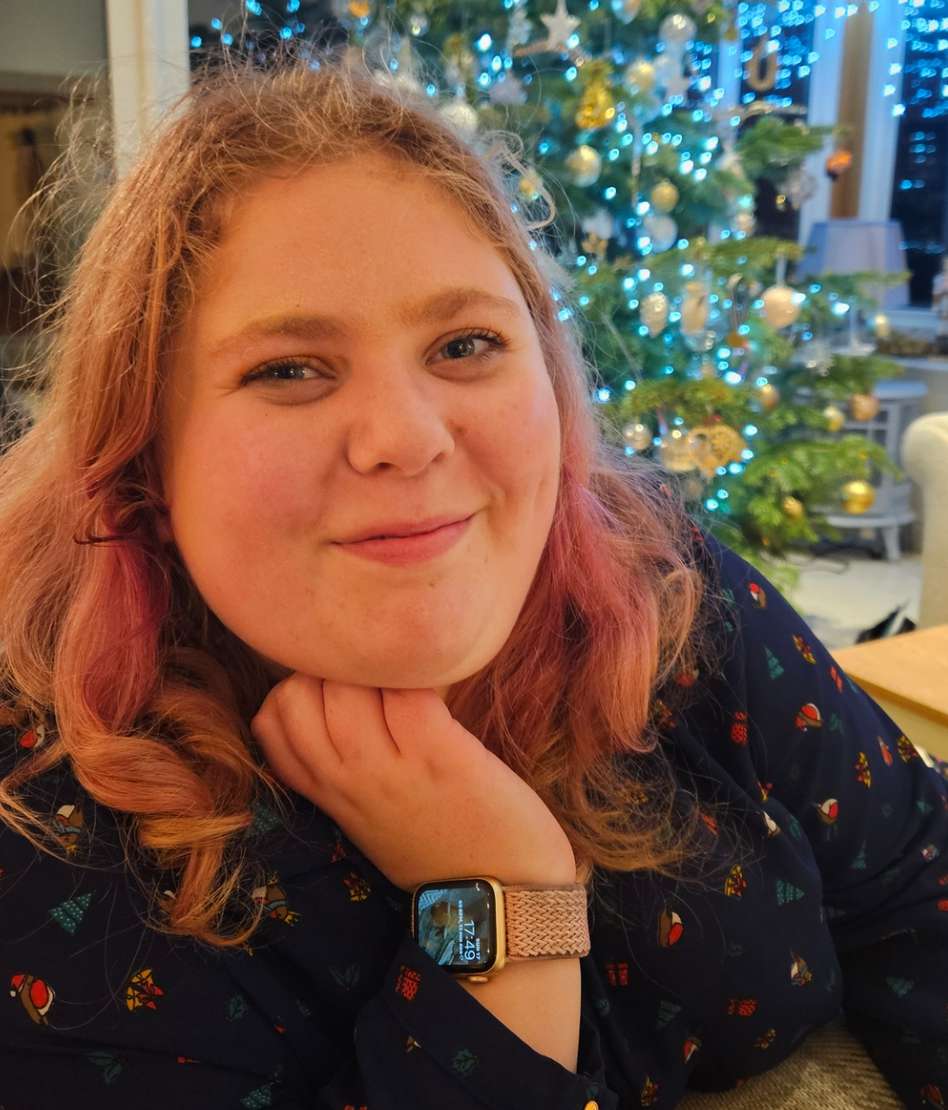Katie's journey with TB Meningitis: resilience, recovery, and justice

When Katie was just two and a half years old, she became severely ill with tuberculous (TB) meningitis. This is her story.
Katie is a bright and bubbly young woman who loves children and animals, enjoys trampolining, horse riding and public speaking, and would love to have a family one day. Her mum, Sarah, her dad, Martin, and her two siblings, Oscar and Jessica, love her dearly.
And yet, Katie’s engaging and friendly nature conceals a daily struggle.
When she was just a year old, Katie was exposed to TB and, unbeknownst to her family, infected. Failings in the contact tracing procedure meant that Katie was never identified as a close contact or tested for tuberculosis – and that meant she never received the treatment she desperately needed. Sixteen months later, Katie was fighting for her life, her brain under attack from the TB infection, which had travelled through her bloodstream to the meninges, the membranes that protect the brain and spinal cord.
A life-changing injury
In the weeks, months and years following Katie’s recovery, it slowly became apparent that she had suffered irreversible and life-changing damage to her brain.
Katie’s brain injury resulted in both physical difficulties, including balance issues, dyspraxia (a common disorder that affects movement and co-ordination) and left-sided hemiparesis (weakness on one side of the body), as well as neurological and cognitive deficits, including impaired executive function, problem-solving difficulties and behavioural difficulties.
She also underwent precocious (early) puberty at the age of just seven as a direct result of her injuries, and suffered damage to her hypothalamus, the area of the brain responsible for appetite control and satiety signals. This has led to a lifelong struggle with weight management and obesity. In addition, she lost most of her sight which, despite some initial improvements, mean that she is now registered as partially sighted.
Katie’s daily struggle
Katie’s brain injury has had wide-reaching effects that affect every aspect of her life. Due to the extent of her sight loss and cognitive deficits, her independence is sadly limited at a time when most kids are flying the nest, excited to start their adult lives.
Sight loss
Katie’s poor eyesight means that she struggles to do things on her own and feels understandably stressed when navigating new and unfamiliar locations. Reading and writing is a huge effort, as she needs special tools and large fonts to make out the words clearly. Trips and falls are common as it’s not easy for Katie to see obstacles and trip hazards. Even getting a driver’s license, the dream of many teenagers craving independence, is out of reach for Katie.
Getting around
Intensive physiotherapy as a child helped improve Katie’s strength and stability, but she still has issues with balance and coordination. Her frequent trips and falls, a result of dyspraxia as well as her sight loss, have knocked Katie’s confidence at times, and she’s especially prone to falls when she’s tired or stressed. She can find it tough to balance when reaching for objects in high or low places and must hold on to a wall or banister when going up or down the stairs.
Cognitive impairments
Katie’s brain damage means that she has developmental and cognitive disabilities and will need lifelong care and supervision. As she has short-term memory issues, Katie’s mum and dad prompt her to do the simplest of tasks, like clean her teeth, change her sanitary pads or have a shower. Without this constant encouragement guidance, Katie doesn’t have the ability or motivation to get things done on her own, and decision-making is difficult without parental guidance. Katie’s parents help her remember things by writing down tasks on her iPad, but she still needs regular supervision to ensure she has ticked things off her list.
Her brain injuries have impacted Katie’s ability to problem-solve, so she finds it hard to work out how to do things that fall outside her regular routine. For example, when her usual ticket machine was broken, she couldn’t work out a solution that might seem obvious to most of us (i.e., to use a different machine).
Most worrying for her parents and medical team, however, is Katie’s lack of control and impulsivity around food (caused by damage to her hypothalamus). Her brain injury means she’s struggled with weight management and obesity all her life. Although she knows all about healthy eating and what she needs to do to lose weight, she is simply unable to put this knowledge into practice when food is around. Sadly, this means that Katie is at high risk of developing type 2 diabetes and other obesity-related health issues, and she might need weight loss surgery in the future if she can’t lose the weight by herself. Katie will need lifelong support from her parents, dieticians and personal trainers to ensure she stays as healthy and happy as possible.
Katie’s fight for justice
Despite the daily obstacles she faces, Katie’s story is one of resilience, determination and bravery. With the unwavering support of her mum and dad and the expert team surrounding her, she continues press forward. Her brightness of spirit and zest for life touch everyone she meets.
Sadly, Katie’s complex needs have taken a financial toll on her mum and dad, who have at times struggled to make ends meet due the cost of looking after her.
So, with a view to ensuring Katie’s long-term health, happiness and safety, Sarah and Martin turned to the specialist Medical Negligence lawyers at Tees Law in Cambridge. The legal team, led by department head Janine Collier, helped the family reach a settlement designed to provide Katie with the lifelong medical care, therapy and support she will need to maximise her independence and quality of life.
The settlement means that she’ll be able to access adaptive aids and equipment, accommodation, medical treatment, therapies, holidays and leisure activities, and simply enjoy life like any other young woman her age. For her mum, who has been unable to work for large stretches of Katie’s life due to her caring responsibilities, and her dad, the settlement has come as a huge relief.
Janine Collier, partner and Isobel Feonander, senior associate who fought alongside Sarah and Martin to achieve justice for Katie, said: “These completely avoidable injuries have not only transformed Katie’s life, but the lives of her mum and dad, her siblings, and their extended family. Quite apart from her physical and cognitive disabilities, the sheer cost of caring for a young woman like Katie is always tough. This settlement can’t change or make up for what has happened to Katie; it can, however, help deliver her the best possible quality of life as she moves into adulthood.”
Tees are here to help
We have many specialist lawyers who are based in:
Cambridgeshire: Cambridge
Essex: Brentwood, Chelmsford, and Saffron Walden
Hertfordshire: Bishop's Stortford and Royston
But we can help you wherever you are in England and Wales.
Chat to the Author, Isobel Foenander
Senior Associate, Medical Negligence, Bishop's Stortford office
Meet Isobel
- Areas of expertise
- Testimonials
Anonymous
All the members of Tees' legal team were very professional. Isobel in particular was absolutely wonderful, she was engaging and always responded promptly. I was kept informed all the time, explaining everything very clearly. I am so pleased to have worked with her.
Anonymous
Bishop's Stortford
'I appreciate everything you’ve done and continue to do for me right from the first time we spoke'
Anonymous
Bishop's Stortford
'A positive outcome. Thank you for all your support and kindness. I finally have closure'
Anonymous
Bishop's Stortford
'I feel a real sense of closure which I am hoping will help to improve how I feel about the whole thing. I can't thank you enough for all the hard work you have put in'
Anonymous
Bishop's Stortford
I absolutely trust your judgment.
Anonymous
Bishop's Stortford
'It has been a great help to me mentally to be listened to and taken seriously. Your service has been very impressive'
